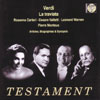Verdi (La) Traviata
A deeply satisfying 1956 performance, rewardingly cast and conducted
View record and artist detailsRecord and Artist Details
Composer or Director: Giuseppe Verdi
Genre:
Opera
Label: Testament
Magazine Review Date: 6/2005
Media Format: CD or Download
Media Runtime: 142
Mastering:
Mono
ADD
Catalogue Number: SBT21369

Tracks:
| Composition | Artist Credit |
|---|---|
| (La) traviata |
Giuseppe Verdi, Composer
Arturo La Porta, Baron, Baritone Cesare Valletti, Alfredo Germont, Tenor Coro del Teatro dell'Opera di Roma Dario Caselli, Doctor, Bass Giuseppe Verdi, Composer Glauco Scarlini, Gastone, Tenor Leonard Warren, Giorgio Germont, Baritone Leonardo Monreale, Marquis, Bass Lydia Marimpietri, Flora, Mezzo soprano Orchestra del Teatro dell'Opera di Roma Pierre Monteux, Conductor Rina Allesandri Maccagnani, Annina, Soprano Rosanna Carteri, Violetta, Soprano Salvatore di Tommaso, Giuseppe, Tenor |
Author: Alan Blyth
This version, admired by cognoscenti, has too long been lost in limbo, victim in the late 1950s of the break-up of the HMV/Victor alliance. Once more Testament has come to the rescue of a neglected treasure. Monteux seems an unlikely conductor; Verdi was a composer, it seems, he seldom approached. You would hardly know that from his finely shaped, rhythmically precise reading, notable in particular for both the orchestra’s and the singers’ emphasis on legato. Traditional cuts of the time are observed, but so too are they on the much-admired versions listed.
You would be lucky indeed to hear today three principals with voices so appropriate to their roles and with the wherewithal as regards technique to fulfil all the exigent requirements their roles call for. Rosanna Carteri, a soprano too little recorded, has the ideal voice, hovering between lirico and spinto, to satisfy the vocal and dramatic demands of the part, and her line is unfaltering. In her day she had to stand comparison with Callas’s intense, tragic interpretation and, later, Scotto’s equally eloquent one. In fact, Carteri’s less overtly emotional interpretation is its own advocate, not least because it is so impeccably sung and carefully built towards the tragedy of Act 3 – the reading of the letter and subsequent ‘Addio del passato’ truly rend the heart.
Cesare Valletti is just about an ideal Alfredo, as he was two years later at Covent Garden with Callas. A pupil of Tito Schipa, he sings with that master’s equable phrasing, fine-honed diction and lightly balanced tone, with a plangent touch adding to a suitably youthful and emotionally vulnerable portrayal.
As father Germont, Leonard Warren – famous in the part at the Metropolitan – sings with the mellow tone and care for words that were his hallmarks, allied to just the right paternal concern once he is on Violetta’s side: it would be hard to imagine ‘Di Provenza’ being more sensitively sung. As bonuses, we have souvenirs of his Count of Luna, Don Carlo and Boccanegra – the last in the ‘Recognition’ duet with Varnay (not a natural Verdian) as Maria, a disc made just after they had sung the roles at the Met in 1949.
Testament offers texts and translations. The Traviata sound suffers rather from occasional overloading, apparently present on the original tapes, and some slightly harsh string tone, but nothing serious enough to prevent me recommending this alongside the Lisbon Callas set conducted by Ghione and the DG version with Ileana Cotrubas.
You would be lucky indeed to hear today three principals with voices so appropriate to their roles and with the wherewithal as regards technique to fulfil all the exigent requirements their roles call for. Rosanna Carteri, a soprano too little recorded, has the ideal voice, hovering between lirico and spinto, to satisfy the vocal and dramatic demands of the part, and her line is unfaltering. In her day she had to stand comparison with Callas’s intense, tragic interpretation and, later, Scotto’s equally eloquent one. In fact, Carteri’s less overtly emotional interpretation is its own advocate, not least because it is so impeccably sung and carefully built towards the tragedy of Act 3 – the reading of the letter and subsequent ‘Addio del passato’ truly rend the heart.
Cesare Valletti is just about an ideal Alfredo, as he was two years later at Covent Garden with Callas. A pupil of Tito Schipa, he sings with that master’s equable phrasing, fine-honed diction and lightly balanced tone, with a plangent touch adding to a suitably youthful and emotionally vulnerable portrayal.
As father Germont, Leonard Warren – famous in the part at the Metropolitan – sings with the mellow tone and care for words that were his hallmarks, allied to just the right paternal concern once he is on Violetta’s side: it would be hard to imagine ‘Di Provenza’ being more sensitively sung. As bonuses, we have souvenirs of his Count of Luna, Don Carlo and Boccanegra – the last in the ‘Recognition’ duet with Varnay (not a natural Verdian) as Maria, a disc made just after they had sung the roles at the Met in 1949.
Testament offers texts and translations. The Traviata sound suffers rather from occasional overloading, apparently present on the original tapes, and some slightly harsh string tone, but nothing serious enough to prevent me recommending this alongside the Lisbon Callas set conducted by Ghione and the DG version with Ileana Cotrubas.
Discover the world's largest classical music catalogue with Presto Music.

Gramophone Digital Club
- Digital Edition
- Digital Archive
- Reviews Database
- Full website access
From £8.75 / month
Subscribe
Gramophone Full Club
- Print Edition
- Digital Edition
- Digital Archive
- Reviews Database
- Full website access
From £11.00 / month
Subscribe
If you are a library, university or other organisation that would be interested in an institutional subscription to Gramophone please click here for further information.




